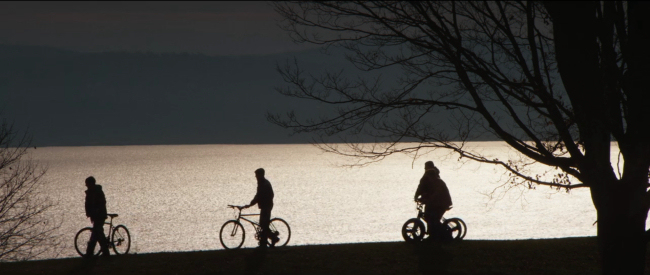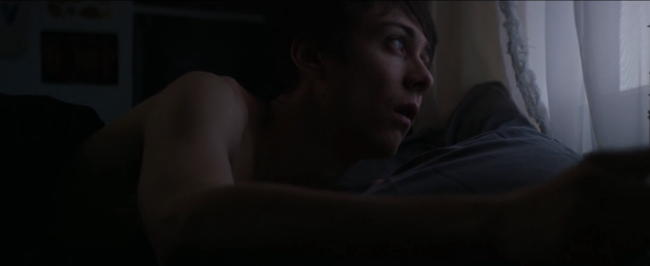
One of the points where I knew 2017's Super Dark Times was working excellently was when I realised I was hoping to find out one of the teenage boys really was a murderer. That it would, in a strange way, be relief to find out. I knew the movie was good before this, though, because of how sharply it built its sense of paranoia and suspense. It does so by developing the personalities of a small group of ordinary teenage boys.

It's that familiar image again; boys on bicycles wearing enormous coats. You've seen it in Super 8, Stranger Things, and probably in the new It (I don't know, I haven't seen it). There's undeniably a trend here and it reminds me a bit of the 1970s' rediscovery of film noir or the 1980s nostalgia for the 50s. But Super Dark Times is more like American Graffiti than Back to the Future; it's less of an attempt to conjure a feeling of a certain type of film than what feels like a genuine reminiscence of the world the filmmaker grew up in.

The dialogue between Zach (Owen Campbell) and Josh (Charlie Tahan) has such a natural feel to it, the first part of the film crucially establishing normal life for the two boys and their friends; the typical posturing to cover insecurities, talking about girls, masturbation, video games, and drugs. The actors are really good, their facial expressions showing hints of the internal thoughts as we're watching them, thinking more about why they're saying the things they're saying instead of what they're actually saying.

Then someone gets killed in a very plausible way. I was reading Hitchcock Truffaut yesterday, Francois Truffaut's book length interview with Alfred Hitchcock, and in the introduction Truffaut says that in his films Hitchcock feeds "a maximum amount of tension and plausibility into the drama, pulling the strings ever tighter as he builds up toward a paroxysm." That's just what Super Dark Times does--a group of kids playing with the marijuana and the Japanese sword belonging to the absent older brother of one of the boys. It's exactly the kind of thing that probably happened in thousands of groups of boys in thousands of American neighbourhoods, and every now and then, we do hear about someone getting hurt.

Most of the film is from Zach's point of view and after the incident we see the truly insidious effect it has on his mind, how the anxieties about the accident blend with the normal anxieties of a teenager. How his insecurities surrounding his sexual attraction to a girl in his class (Elizabeth Cappuccino) get mixed up with his anxieties about the incident and keeping it secret. His whole teenage mind had been absorbed in handling his normal confusion and urges, now he's compulsively using his same rudimentary faculties to deal with the blood on his hands. One kind of ambiguous guilt and compulsion turns into another. When he finds he's unable to kiss the girl he likes for reasons probably mysterious for him it's terribly sad to see. As we watch him become more preoccupied, as the incident dominates all his decision making and dreams, we get to the point where we hope it's real, just so everyone else can be on the same page as him.

The cinematography by Eli Born is some really beautiful, autumnal imagery, some nice balances of light and very dark. The film is a very effective portrait of tension.
Twitter Sonnet #1164
A standing bean commences jumping now.
In thoughts of roots the nutrients attend.
In diamonds shadows sketched a dreaming cow.
As cattle roam the leaves of grass descend.
A tabled salt re-flavoured crustless bread.
A blank interprets written space to go.
The lives of living paint were never dead.
Enormous feet became a single heavy toe.
Emerging lines divide the merging cars.
Potato almond cakes abide on dusty shelves.
Exotic gin resolves the need for bars.
The taller dwarves became the shorter elves.
A brittle leaf diffused the powder sky.
Electric silence passed without a sigh.

No comments:
Post a Comment